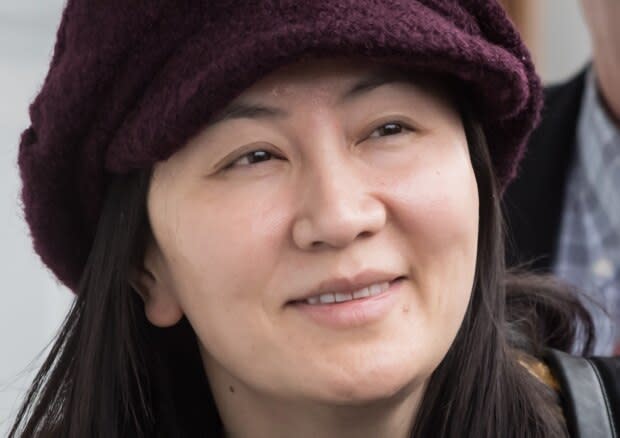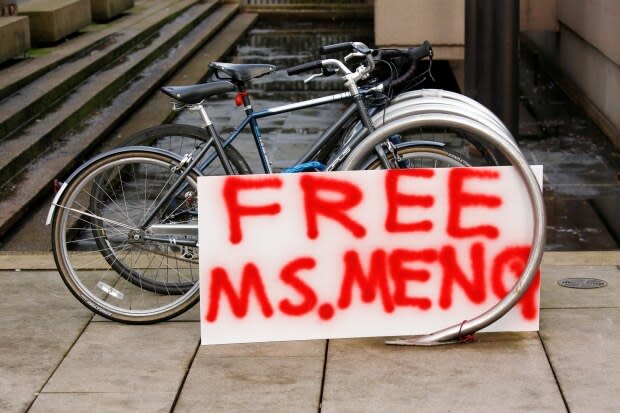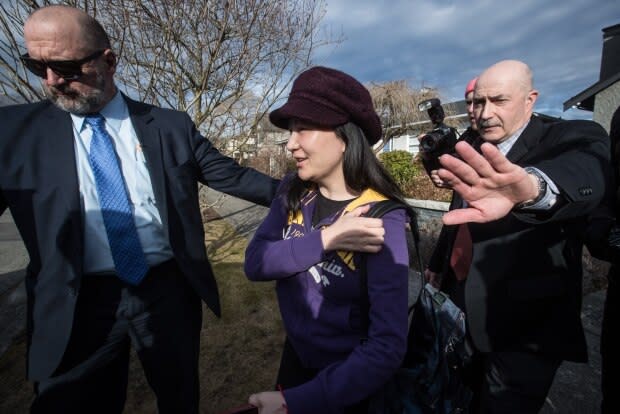Meng Wanzhou claims 'covert criminal investigation' by Canadian, U.S. authorities
Lawyers for Meng Wanzhou claim she was the target of a "covert criminal investigation" designed by Canadian and U.S. authorities to illegally detain and search the Huawei executive when she landed in Vancouver in December 2018.
The allegation is fleshed out in hundreds of pages of documents filed in B.C. Supreme Court Tuesday in a bid for copies of correspondence between agencies during the crucial hours surrounding Meng's arrest after she arrived at Vancouver International Airport from Hong Kong on Dec.1.
The material includes video of the Huawei chief financial officer in the moments after she stepped off a Cathay Pacific flight and into a global dispute that continues to rock relations between Canada and China.
Meng's lawyers claim notes included in the documents suggest RCMP originally planned to arrest Meng on the plane, but decided to have the Canada Border Services Agency detain her instead in order to collect evidence at the direction of the Canadian Department of Justice and the U.S. Federal Bureau of Investigation.
'Economic and political gain'
The defence claims Meng's Charter rights were violated and that the Canadian judicial process is being abused in order to further the economic and political interests of the United States as it fights a trade war with China.
"The U.S. is attempting to use these extradition proceedings for economic and political gain," Meng claims in a document outlining her case.
"It provides important context to what occurred upon [Meng's] arrival in Canada on December 1, 2018 ... the U.S. has engaged in a long-standing effort to target [Meng] and others affiliated with her employer, Huawei Technologies."

The 47-year-old was arrested on a U.S. extradition warrant last December on a stopover from Hong Kong to Buenos Aires.
According to an indictment unsealed in January, Meng and Huawei face 13 criminal counts of conspiracy, fraud and obstruction in the U.S. The charges relate to an alleged scheme to circumvent sanctions against Iran through a shadow company in Tehran that prosecutors say was actually controlled by Huawei.
Meng is accused of lying about the relationship — putting U.S. banks at risk of violating sanctions.
She is currently living under a form of house arrest in one of two multi-million dollar homes she owns in Vancouver, after being released on $10 million bail.
The latest documents were filed in support of an application for disclosure of notes, texts, emails and other correspondence between RCMP, CBSA, the Canadian government and the FBI.
The defence claims the material supports the allegation the agencies were in constant contact with each other in the hours after Meng was detained but before she was actually arrested.
The court will hear the application next month. Meng's extradition hearing itself is set to begin in January.
'Complicated' case
The affidavits include handwritten notes from the RCMP members involved in Meng's arrest.
One states that the case is "complicated" and another — written in advance of her arrival — says that officers didn't want to make an online request for her flight manifest, fearing it wouldn't stay secret.

According to the documents, once Meng was detained by CBSA officers and sent for secondary inspection, she repeatedly asked why. Her lawyers claim she was given no answer.
Instead, she was allegedly asked "if her company sold products in countries that they should not."
"I rephrased the question and asked the subject if her company sold products or did business in Iran," one CBSA officer's notes read. "The subject initially stated 'I don't know.' "
'You're saying I committed fraud'
The documents also include a transcript of Meng's interview with two RCMP officers at the time she was officially arrested, three hours after she was sent for secondary inspection.
She appears confused as officers tell her that they're arresting her and sending her to the United States for committing fraud.

"Me?" she replies.
"You think that ... You're saying I committed fraud in the United States?" she later asks. "I'm not clear what has happened. Why would I have an arrest warrant, and I have got involved in fraud?"
She is given a basic outline of the case and responds: "You're saying, because of my company, you're arresting me?"
Meng then asks if she can call family members and is told: "You cannot."
'It would be unconscionable'
In the months since Meng's arrest Canada has faced relentless pressure from China to release the Huawei executive.
Two Canadians are currently in prison accused of spying as part of allegations Canadian officials have described as retaliation for Meng's arrest and two others are facing the death penalty for their roles in drug trafficking rings.

China has also blocked the sale of Canadian canola seed, affecting the fortunes of Prairie farmers.
Meng's defence team has previously suggested that Canada should not do the bidding of the United States, pointing to U.S. President Donald Trump's assertion that he might intervene in the case if it could secure a trade deal.
In the latest court filings, they note the "international political firestorm" sparked by her arrest and Trump's "ominous" statements.
"It would be unconscionable to return her to the U.S. in this climate," the lawyers state.
"The U.S. should be disentitled from using the [Immigration] Act to seek [Meng's] extradition in circumstances where its President has made odious statements undermining the rule of law and disrespecting Canada's sovereignty."


